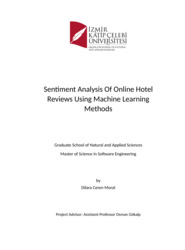Sentiment Analysis Of Online Hotel Reviews Using Machine Learning Methods
-
Eser Sahibi
Dilara Ceren Moral
- Tez Danışmanı OSMAN GÖKALP
-
Tür
Diğer
- Yayın Tarihi 2023
-
Yayıncı
İzmir Katip Çelebi Üniversitesi Fen Bilimleri Enstitüsü
- Tek Biçim Adres https://hdl.handle.net/11469/3456
-
Konu Başlıkları
Sentiment analysis
Deep learning
NLP
This project shows a Python-based Natural Language Processing (NLP) study of online hotel reviews. This study's goal was to do sentiment analysis on a dataset derived from TripAdvisor user reviews that was obtained through the Kaggle platform. In this NLP study, deep learning methods, TensorFlow, and Sklearn were the key libraries used. Machine learning models, such as Logistic Regression, were created and tested for sentiment analysis. A deep learning model built on TensorFlow was further used. The most accurate classifier was the Logistic Regression model, which on the training set had an accuracy score of 0.858. The results from the deep learning model were equally successful. Further analysis of the testing set produced an accuracy score of 0.86 overall, with both models doing well in detecting positive sentiments. The research's conclusions show how sentiments expressed in online hotel evaluations may be automatically analyzed and classified using machine learning techniques, including deep learning. Hotel managements can benefit from the knowledge gathered from this study by using it to better understand guest preferences and make decisions that will improve service quality.
-
Koleksiyonlar
ENSTİTÜLER
FEN BİLİMLERİ ENSTİTÜSÜ

 Tam Metin
Tam Metin

